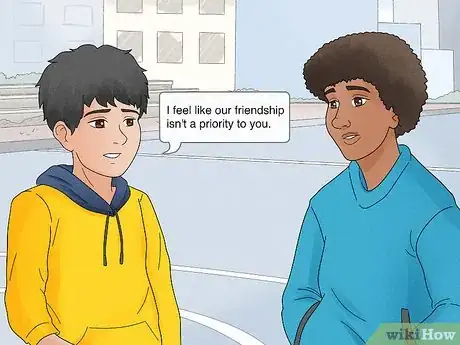This article was co-authored by Allison Broennimann, PhD and by wikiHow staff writer, Janice Tieperman. Dr. Allison Broennimann is a licensed Clinical Psychologist with a private practice based in the San Francisco Bay Area providing psychotherapy and neuropsychology services. With over a decade of experience, Dr. Broennimann specializes in in-depth psychotherapy to provide solution-focused treatments for anxiety, depression, relationship problems, grief, adjustment problems, traumatic stress, and phase-of-life transitions. And as part of her neuropsychology practice, she integrates depth psychotherapy and cognitive rehabilitation for those recovering after traumatic brain injury. Dr. Broennimann holds a BA in Psychology from the University of California, Santa Cruz, and an MS and Ph.D. in Clinical Psychology from Palo Alto University. She is licensed by the California Board of Psychology and is a member of the American Psychological Association.
This article has been viewed 161,436 times.
Do you have trouble opening up to the world around you? If so, you have nothing to be ashamed of. In fact, it takes a lot of courage to be open, honest, and vulnerable with the people in your life, whether they’re a friend, loved one, partner, or acquaintance. Don’t worry. We’ve put together some tips, tricks, and suggestions that might make it a little easier to open up in your next conversation.
Steps
Expert Q&A
Did you know you can get premium answers for this article?
Unlock premium answers by supporting wikiHow
-
QuestionWhat if I can't open up to people during the pandemic?
 Allison Broennimann, PhDDr. Allison Broennimann is a licensed Clinical Psychologist with a private practice based in the San Francisco Bay Area providing psychotherapy and neuropsychology services. With over a decade of experience, Dr. Broennimann specializes in in-depth psychotherapy to provide solution-focused treatments for anxiety, depression, relationship problems, grief, adjustment problems, traumatic stress, and phase-of-life transitions. And as part of her neuropsychology practice, she integrates depth psychotherapy and cognitive rehabilitation for those recovering after traumatic brain injury. Dr. Broennimann holds a BA in Psychology from the University of California, Santa Cruz, and an MS and Ph.D. in Clinical Psychology from Palo Alto University. She is licensed by the California Board of Psychology and is a member of the American Psychological Association.
Allison Broennimann, PhDDr. Allison Broennimann is a licensed Clinical Psychologist with a private practice based in the San Francisco Bay Area providing psychotherapy and neuropsychology services. With over a decade of experience, Dr. Broennimann specializes in in-depth psychotherapy to provide solution-focused treatments for anxiety, depression, relationship problems, grief, adjustment problems, traumatic stress, and phase-of-life transitions. And as part of her neuropsychology practice, she integrates depth psychotherapy and cognitive rehabilitation for those recovering after traumatic brain injury. Dr. Broennimann holds a BA in Psychology from the University of California, Santa Cruz, and an MS and Ph.D. in Clinical Psychology from Palo Alto University. She is licensed by the California Board of Psychology and is a member of the American Psychological Association.
Clinical Psychologist Right now, we're all feeling a desire to protect ourselves. If and when things start to open up, it might feel a little weird. During that time, it will be really important to be honest with your friends and family about feeling nervous to see each other again. Give each other permission to back out any minute that you feel scared until everyone gets back into their groove.
Right now, we're all feeling a desire to protect ourselves. If and when things start to open up, it might feel a little weird. During that time, it will be really important to be honest with your friends and family about feeling nervous to see each other again. Give each other permission to back out any minute that you feel scared until everyone gets back into their groove.
References
- ↑ https://www.psychologytoday.com/us/blog/click-here-happiness/201810/how-be-yourself-in-five-simple-steps
- ↑ https://www.psychologytoday.com/us/blog/click-here-happiness/201810/how-be-yourself-in-five-simple-steps
- ↑ https://www.betterhelp.com/advice/anxiety/how-to-open-up-to-people-when-its-not-easy/
- ↑ https://www.betterhelp.com/advice/how-to/learning-how-to-open-up-to-people/
- ↑ https://www.betterhelp.com/advice/how-to/learning-how-to-open-up-to-people/
- ↑ https://www.betterhelp.com/advice/anxiety/how-to-open-up-to-people-when-its-not-easy/
- ↑ https://www.psychalive.org/embracing-vulnerability-strengthens-connections/
- ↑ https://www.healthyplace.com/relationships/healthy-relationships/how-to-open-up-and-reveal-yourself-to-others
- ↑ https://www.betterhelp.com/advice/anxiety/how-to-open-up-to-people-when-its-not-easy/
About This Article
Opening up about your feelings can be tough, but it’s an important part of forming meaningful relationships. You don’t need to open up to everyone you meet, but try sharing things with friends and family that you trust and who you don’t think will judge you. Start by sharing smaller personal things so you can test the waters with the person’s reaction. For example, if they ask how you’ve been, you can say something like, “Not so good. I’ve had a bit of a depressing week to be honest.” If they seem empathetic, you can share more intimate things with them as you get more comfortable. You can also try writing in a journal before you share something with another person, which can help you make sense of your feelings and practice expressing yourself. For more tips from our co-author, including how to be open to new experiences, read on!








































































